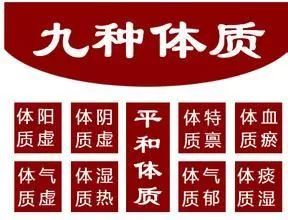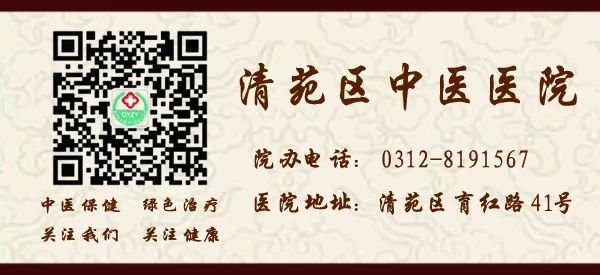Click the “Public Account” above to subscribe!
Traditional Chinese Medicine (TCM) has its own methods for health maintenance, and it is essential to practice health preservation according to one’s TCM constitution. TCM categorizes human constitutions into nine types.

Pinghe Constitution (Balanced Constitution)
The Pinghe constitution, also known as the “Balanced Constitution,” is the most stable and healthiest constitution! It generally arises from good innate endowment and proper postnatal nurturing. The Pinghe constitution is characterized by a moderate physique, rosy complexion, abundant energy, and robust organ function. Approximately 32.75% of the population falls into this category, which is about one-third. Males are more prevalent than females, and the proportion of individuals with a Pinghe constitution decreases with age.
Physical Characteristics: Well-proportioned and strong physique.
Psychological Characteristics: Easy-going and cheerful personality.
Common Manifestations: Rosy complexion, moist skin, thick and shiny hair, bright eyes, clear nasal passages, rosy lips, not easily fatigued, abundant energy, tolerant of cold and heat, good sleep, good appetite, normal bowel movements, pale red tongue, thin white coating, and a soft, strong pulse.
Tendency to Illness: Rarely falls ill.
Adaptability to External Environment: Strong adaptability to natural and social environments.
Individuals with a Pinghe constitution are less prone to illness. “When the righteous qi is present, evil cannot invade.” People with this constitution generally have abundant righteous qi, strong resistance, and can tolerate cold, heat, dryness, and humidity, making them less susceptible to external pathogens. However, robust individuals often neglect self-protection, leading to injuries or illnesses due to carelessness. With seasonal changes, they should adjust their clothing accordingly, avoid heat and cold, and prevent external illnesses such as colds, heatstroke, and frostbite. During epidemics, they should enhance self-protection and cut off transmission routes.
Qi Deficiency Constitution
The Qi deficiency constitution is similar to the Yang deficiency constitution and is classified as a deficient constitution. Yang deficiency is characterized by insufficient warmth, weak Yang qi, lack of warmth, and a fear of cold. The Qi deficiency constitution also exhibits these tendencies but primarily reflects weakened organ function. Individuals with a Qi deficiency constitution have relatively weak lung and spleen functions.
Overall Characteristics: Insufficient vital energy, primarily manifested as fatigue, shortness of breath, and spontaneous sweating.
Physical Characteristics: Soft and weak muscles.
Common Manifestations: Usually speaks softly, short of breath, easily fatigued, low energy, prone to sweating, pale red tongue with tooth marks, and weak pulse.
Psychological Characteristics: Introverted personality, not fond of risk.
Adaptability to External Environment: Poor tolerance to wind, cold, heat, and dampness.
Insufficient Qi is often reflected in low speech, fatigue, soft muscles, unstable emotions, and anxiety. Externally, one may appear pale or slightly yellow, prone to sweating, with a pale, swollen tongue, tooth marks on the tongue, slow gait, and symptoms such as dizziness, forgetfulness, spontaneous sweating, fatigue, loose stools, abdominal distension, reduced appetite, palpitations, drowsiness, shortness of breath, chest tightness, lower limb edema, clear and frequent urination, drooling during sleep, and pale eyes. These symptoms are due to insufficient Qi leading to weakened organ functions, failing to meet normal physiological requirements.
Yin Deficiency Constitution
The Yin deficiency constitution refers to a state where the internal Yin fluids are insufficient due to organ dysfunction, leading to symptoms of internal heat from Yin deficiency. Common manifestations include thin physique, flushed cheeks, heat in palms and soles, night sweats, irritability, dry mouth, and dry skin and hair. The tongue is dry and red with little coating, and it may even be smooth and without coating. This condition often arises from external invasion of dryness and heat, excessive consumption of warming and drying foods, excessive worry, irregular sexual activity, or prolonged illness.
Overall Characteristics: Insufficient Yin fluids, primarily manifested as dry mouth and throat, heat in palms and soles.
Common Manifestations: Heat in palms and soles, dry mouth and throat, slightly dry nose, preference for cold drinks, dry stools, red tongue with little moisture, and thin rapid pulse.
Psychological Characteristics: Impulsive and active personality.
Tendency to Illness: Prone to deficiency-related illnesses, insomnia, etc.; susceptible to heat-related pathogens.
Individuals with a Yin deficiency constitution primarily exhibit external signs of deficiency heat, such as flushed complexion, heat in palms and soles, night sweats, red tongue with little moisture, dry mouth and throat, thin physique, and rapid pulse. Heart Yin deficiency can lead to irritability, palpitations, insomnia, and vivid dreams, increasing the risk of coronary heart disease, myocardial ischemia, and myocarditis. Liver Yin deficiency may cause irritability, dry eyes, blurred vision, and subtle pain in the sides, necessitating prevention of chronic cholecystitis, chronic viral hepatitis, and hypertension.
Yang Deficiency Constitution
The Yang deficiency constitution arises when the body’s organ functions are impaired, leading to insufficient Yang qi and internal cold. Common manifestations include pale complexion, weak breath, fatigue, cold extremities, and overall weakness or edema. The tongue is pale, swollen, with tooth marks, thin white coating, and a weak pulse. This condition often results from congenital deficiencies, external invasion of cold, excessive consumption of cold foods, extreme worry, irregular sexual activity, or prolonged illness.
Overall Characteristics: Insufficient Yang qi, primarily manifested as fear of cold and cold extremities.
Physical Characteristics: Soft and weak muscles.
Common Manifestations: Generally fears cold, cold extremities, prefers warm foods, low energy, pale swollen tongue, and slow pulse.
Psychological Characteristics: Generally calm and introverted personality.
Tendency to Illness: Prone to phlegm retention, edema, diarrhea, etc.; susceptible to cold pathogens.
Yang deficiency leads to internal cold, causing pathological products to accumulate and impairing organ functions. Heart Yang deficiency can result in weak heartbeats, inadequate nourishment of the heart, pale complexion, pale lips and tongue, dizziness, and potentially lead to chest tightness, angina, and bradycardia, increasing the risk of coronary heart disease and low blood pressure. Stomach Yang deficiency may manifest as abdominal cold pain (relieved by warmth), indigestion, vomiting, hiccups, and loss of appetite, increasing the risk of gastric ulcers.
Blood Stasis Constitution
The blood stasis constitution refers to a state where the body’s organ functions are impaired, leading to poor blood circulation or internal bleeding that cannot dissipate, resulting in blood stasis. Common manifestations include a dull complexion, rough skin with brown discoloration, pigmentation, or purpura, pale lips, and a tongue that is dark purple or has stasis spots, with a thin and choppy pulse. This condition often arises from emotional disturbances, aging, or prolonged illness. Symptoms may vary depending on the location of blood stasis in the organs and meridians. Tendency to illness: prone to masses, pain syndromes, and blood disorders. The general treatment principle is to invigorate blood circulation and resolve stasis, with regular care to improve blood stasis constitution and prevent disease.
Overall Characteristics: Poor blood circulation, primarily manifested as dull complexion and purple tongue.
Psychological Characteristics: Prone to irritability and forgetfulness.
Common Manifestations: Dull complexion, pigmentation, easy bruising, pale lips, dark or stasis spots on the tongue, purple or thickened sublingual veins, and a choppy pulse.
Tendency to Illness: Prone to masses, pain syndromes, and blood disorders.
Adaptability to External Environment: Poor adaptability to mental stress; intolerant to cold pathogens.
Impaired Qi and blood circulation can lead to various discomforts. The blood stasis constitution often presents with dull complexion, dark circles, dry and flaky skin, brittle nails, and dry, split, or tangled hair, affecting women’s beauty. Qi stagnation and blood stasis can also lead to emotional changes, such as irritability. Additionally, women may experience breast tenderness before menstruation, abdominal pain, and are prone to simple obesity, melasma, freckles, and other conditions.
Special Constitution
The special constitution, also known as special physiological defects or allergies, refers to a unique state of constitution caused by genetic and congenital factors, primarily including allergic constitution, hereditary disease constitution, and fetal transmission constitution.
Overall Characteristics: Congenital abnormalities, primarily manifested as physiological defects and allergic reactions.
Physical Characteristics: Individuals with allergic constitution generally have no special features; those with congenital abnormalities may have deformities or physiological defects.
Common Manifestations: Individuals with allergic constitution often experience asthma, hives, throat itching, nasal congestion, and sneezing; those with hereditary diseases may exhibit vertical inheritance, congenital, or familial characteristics; individuals with fetal transmission diseases may show characteristics influenced by maternal factors on fetal growth and related diseases.
Psychological Characteristics: Varies according to individual constitution.
Symptoms of allergic constitution can be diverse: skin itching, flaking, redness, burning, ulceration, and hives, as well as throat itching, eye discomfort, purpura, and even severe symptoms such as respiratory distress, tachycardia, asthma, and syncope. Children with allergic constitution may have complex and varied causes, possibly due to delicate skin that can be easily irritated by wind or sun exposure. Additionally, attention should be paid to whether the child is breastfed. If breastfeeding occurs, the mother’s diet may lead to allergies in the child if she consumes seafood.
Phlegm-Damp Constitution
The phlegm-damp constitution refers to a state where the body’s organ functions are impaired, leading to disordered Qi, blood, and fluid metabolism, resulting in water retention and phlegm accumulation. Common manifestations include obesity, fullness in the abdomen, chest tightness, excessive phlegm, easy fatigue, and a feeling of heaviness. Individuals often prefer rich and sweet foods, with a swollen tongue and a white greasy coating. This condition often arises from external dampness invasion, irregular diet, congenital factors, aging, or lack of exercise, with symptoms varying based on the location of phlegm and dampness retention. Tendency to illness: prone to diabetes, stroke, and chest obstruction, with poor adaptability to rainy and humid environments.
Overall Characteristics: Phlegm and dampness accumulation, primarily manifested as obesity, fullness in the abdomen, and a greasy tongue.
Psychological Characteristics: Generally mild and stable personality, often patient.
Common Manifestations: Oily skin, excessive sweating, chest tightness, excessive phlegm, sticky or sweet taste in the mouth, preference for rich and sweet foods, greasy tongue, and slippery pulse.
Tendency to Illness: Prone to diabetes, stroke, and chest obstruction.
Adaptability to External Environment: Poor adaptability to rainy seasons and humid environments.
The phlegm-damp constitution arises from congenital inheritance, excessive consumption of rich foods, and lack of exercise, leading to water retention and impaired spleen function, resulting in phlegm accumulation. Phlegm retention in the lungs can obstruct lung Qi, causing symptoms such as cough with phlegm, phlegm rattling in the throat, snoring, and even sleep apnea, increasing the risk of chronic bronchitis, chronic asthma, and cough.
Wet-Heat Constitution
Wetness refers to the moisture that can be external or internal. External dampness arises from humid climates, exposure to rain, or living in damp environments, while internal dampness is a pathological product often related to digestive function. TCM believes that the spleen has the function of “transporting and transforming water and dampness.” If the body is weak, digestion is poor, or there is excessive consumption of rich and sweet foods, the spleen cannot function properly, leading to internal dampness accumulation. Additionally, individuals with spleen deficiency are more susceptible to external dampness invasion, which can further obstruct the spleen and stomach, causing internal dampness to develop.
Overall Characteristics: Internal damp-heat, primarily manifested as oily skin, bitter mouth, and yellow greasy tongue.
Physical Characteristics: Medium or slightly thin physique.
Common Manifestations: Oily skin, prone to acne, bitter and dry mouth, heavy body, sticky or difficult bowel movements, short yellow urine, men may experience dampness in the scrotum, and women may have increased vaginal discharge, red tongue, yellow greasy coating, and rapid slippery pulse.
Psychological Characteristics: Prone to irritability and restlessness.
Tendency to Illness: Prone to sores, jaundice, and heat-related conditions.
The wet-heat constitution often arises from congenital factors, improper diet, excessive consumption of rich foods, prolonged exposure to damp environments, or excessive fatigue, leading to internal heat accumulation and phlegm stagnation in the organs. Wet-heat retention in the spleen and stomach can cause symptoms such as bad breath, body odor, obesity, gum bleeding, cravings for cold drinks, easy satiety, and acne around the mouth and lips, increasing the risk of acne, rosacea, folliculitis, eczema, tinea, dental caries, and gingivitis. Wet-heat retention in the liver and gallbladder can lead to symptoms such as bitter mouth, irritability, and pain in the sides, increasing the risk of fatty liver.
Qi Stagnation Constitution
The Qi of the human body is the fundamental force and motivation for life activities. The maintenance of life activities relies on Qi. The Qi in the human body is closely related to congenital endowment, environmental factors, and dietary nutrition, as well as the physiological functions of the kidneys, spleen, stomach, and lungs. Therefore, various physiological activities are essentially manifestations of Qi movement within the body. When Qi cannot be expressed and accumulates internally, it leads to “Qi stagnation.” TCM believes that Qi stagnation is often caused by depression, frustration, and emotional discomfort. Prolonged Qi stagnation can lead to poor blood circulation, severely affecting health.
Overall Characteristics: Qi stagnation, primarily manifested as depression and emotional fragility.
Psychological Characteristics: Introverted, unstable, sensitive, and anxious personality.
Common Manifestations: Depressed mood, emotional fragility, unhappiness, pale red tongue, thin white coating, and wiry pulse.
Tendency to Illness: Prone to organ disorders, plum pit qi, lily disease, and depression.
Adaptability to External Environment: Poor adaptability to mental stress; not suited to rainy weather.
Common symptoms may include distension or pain in the chest, sides, or abdomen, with pain characteristics often being distending, sharp, or cramping, with symptoms varying in intensity and location. Pain may generally ease with belching, bowel sounds, or flatulence, or symptoms may fluctuate with emotional changes, often accompanied by sighing, melancholy, self-talk, or emotional outbursts. Liver Qi stagnation can lead to emotional changes, resulting in depressive or explosive anger, or silent withdrawal, or mental tension and repression.
Each person’s constitution is unique, which is the basis for TCM differential diagnosis and treatment. However, an individual’s constitution is not limited to one type; it can manifest differently based on lifestyle and dietary habits. For a more in-depth understanding of oneself, it is advisable to undergo a TCM-style health examination at a TCM hospital.
Long press the image below to scan the QR code and follow us~


